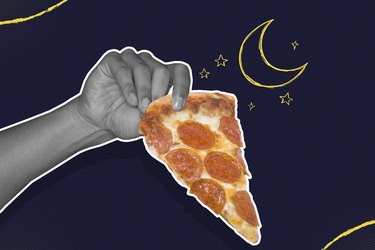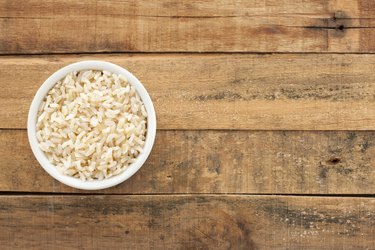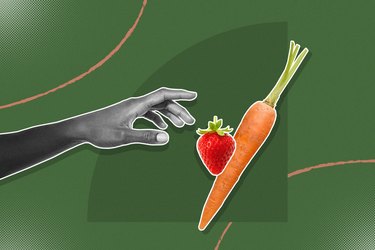
Midnight snacking may be just what you need to take the edge off your hunger and fall asleep, but depending on what you eat, it could carry potential health risks.
Here's what happens when you eat late at night, followed by tips for what to eat before bed or in the middle of the night if hunger strikes.
Video of the Day
Video of the Day
Tip
What happens when you eat late at night? Well, it depends on what and how much you eat. Overeating processed foods before bed can lead to weight gain or digestive issues, whereas a light, healthy snack can help stabilize blood sugar.
1. Your Weight Might Go Up
Eating at night isn't inherently unhealthy as long as you're picking nutritious foods and staying within your daily caloric needs. For instance, eating a small, healthy snack before bed (meaning any snack under about 150 calories) is OK, per an April 2015 review in Nutrients.
But nighttime snacking often leads to overeating, which can contribute to weight gain, according to the Nutrients review.
Feeling tired also influences your appetite to make you crave high-calorie foods, which is why you often turn to snacks like chips, pizza and ice cream to satisfy late-night hunger, per February 2014 research in Nature Communications.
And midnight munching on those processed foods can mess with a hormone called leptin, which tells you when you're full, according to the Cleveland Clinic. If leptin can't signal you to stop eating, you may overeat unhealthy food, which can lead to weight gain over time.
2. Your Digestion May Suffer
You digest best when you're upright and gravity can help move food down through your digestive system, according to the Mayo Clinic. That's why laying in bed after a late-night meal can cause your stomach acid to flow back into your esophagus and give you acid reflux, which can feel irritating and get in the way of a good night's sleep.
Reflux-inducing foods to avoid before bed include:
- Spicy foods
- High-fat foods like fries or baked goods
- Chocolate
- Coffee
- Alcohol
3. Your Blood Sugar Might Change
Another reason why it may be bad to eat late at night is because processed, high-carb foods can cause unhealthy blood sugar spikes, especially for people with diabetes, according to the Mayo Clinic. That's because people with diabetes don't produce enough insulin to balance their blood sugar levels, which can lead to episodes of both high and low blood sugar, per University of Michigan Health.
Snacks to avoid around bedtime include:
- White bread and pasta
- Baked goods
- Chips
- Sweet potatoes
While eating a high-carb bedtime snack may exacerbate these issues, munching on a lower-carb option rich in protein and fiber can help mitigate blood sugar fluctuations that may happen overnight, according to the Mayo Clinic.
Low-carb, high-protein snacks to try include:
- Veggies and hummus
- Egg whites
- Chickpeas
4. Your Growth Hormone Levels Might Go Down
Your pituitary gland secretes human growth hormone (HGH), which helps children grow and builds and repairs tissue like muscles and bones throughout your life, according to the Mayo Clinic. Sleep triggers HGH production, per a May 2021 StatPearls article, which is why much of this growth and repair process happens while you're in deep sleep.
But blood glucose spikes from eating processed carbs and sugary snacks close to bedtime can suppress your HGH levels and stunt those health benefits, according to StatPearls. To avoid under-secreted growth hormone, hold off on midnight eats or opt for nutritious, low-carb snacks instead of trigger foods like processed treats.
Lower-carb snacks to try include:
- Greek yogurt
- Nuts or nut butters
- Low-fat cheese
- Hard-boiled eggs
When Should You Stop Eating at Night?
Sometimes life gets in the way and meals and snack times can vary. But in general, you should aim to eat your final meal of the day about three hours before you go to bed to support healthy digestion and good sleep, per the Mayo Clinic.
5. Your Sleep May Improve

While it's best to skip high-carb, high-sugar snacks before bed, eating certain healthier foods can actually help you get some solid shut-eye, according to the Cleveland Clinic.
Why? Some foods can promote elevated levels of serotonin, a hormone that helps improve your mood and promote good sleep, including:
- Complex carbohydrates like brown rice
- Lean proteins like low-fat cheese and fish
- Nuts
- Herbal tea
Tip
In contrast, what should you not eat at night? High-fat, high-sugar foods like cookies and chips can make it hard for you to fall and stay asleep, per the Cleveland Clinic.
How to Not Eat at Night

Here are some tips on how to not eat if you often find yourself snacking on unhealthy foods before bed or in the middle of the night.
1. Eat Enough During the Day
Your daytime eating schedule can affect your hunger levels come nighttime. Eat protein-rich meals and snacks to keep hunger at bay throughout the day and prevent late-night overeating, per UVA Health.
2. Put Away Your Snacks
Clean up the kitchen after dinner, stash away any easy-to-reach snacks and stay out of the kitchen until breakfast the next morning to avoid mindlessly munching. If you must snack, set aside a single serving of something nutritious so you don't overeat late at night, per UVA Health.
If you wake up in the middle of the night and need to get out of bed, choose another room to sit in besides the kitchen so you're not tempted to snack.
3. Address Sleep Problems
If you're wondering how to stop eating in the middle of the night, sometimes the answer has less to do with your snacking and more to do with your sleep habits.
Not getting enough quality sleep can lead to overeating unhealthy foods at any time of day, per the Sleep Foundation. As a result, dealing with insomnia or poor sleep habits like an inconsistent sleep schedule may help you get better snoozes and prevent unhealthy snacking.
Here are some tips to help you practice better sleep hygiene:
- Fall asleep and wake up around the same times every day.
- Sleep in a dark, cool room.
- Sleep in a quiet room or consistently use music or other soothing sounds to help you sleep.
- Practice relaxation techniques to calm your mind.
If you continue experiencing sleep difficulties, visit your doctor to see if something besides poor sleep hygiene is to blame.
4. Practice Mindful Eating
Before eating at bedtime or in the middle of the night, stop to ask yourself if you're actually hungry or if you just want to snack out of boredom or stress, per the Cleveland Clinic. If you're actually hungry, eat a light snack to tide you over until morning.
- Nutrients: "The Health Impact of Nighttime Eating: Old and New Perspectives"
- Cleveland Clinic: "Late-Night Snacks That Wreck Your Diet (and Sleep)"
- UVA Health: "Why You Binge Snack at Night and How to Stop"
- Sleep Foundation: "Sleep and Overeating"
- Cleveland Clinic: "Decoding Your Hunger: Are You Really Hungry or Not?"
- Nature Communications: "The impact of sleep deprivation on food desire in the human brain"
- Mayo Clinic: "Mayo Clinic Minute: Timing snacks to avoid heartburn"
- Mayo Clinic: "Late-night eating: OK if you have diabetes?"
- Mayo Clinic: "What are your sleep busters?"
- Cleveland Clinic: "Do You Binge Eat at Night? Here’s Why Your Hormones Are to Blame"
- Mayo Clinic: "Human growth hormone (HGH): Does it slow aging?"
- StatPearls: "Physiology, Growth Hormone"
- University of Michigan Health: "Diabetes-Related High and Low Blood Sugar Levels"
- Cleveland Clinic: "5 Foods That Help You Sleep"



